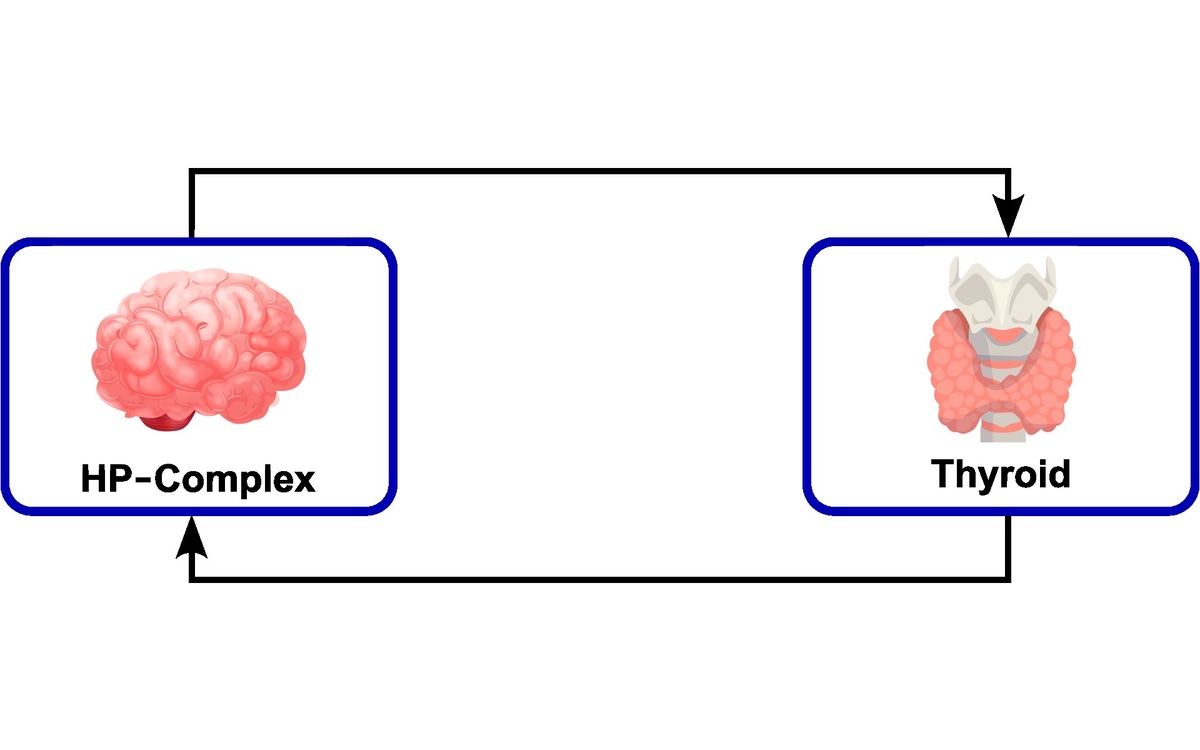
Project Details
- Consortium:
TU Wien, Institute of Analysis and Scientific Computering, Research Group Mathematics in Simulation and Education; Responsible Research Practices
FH Campus Wien, Competence Center for Applied Nursing Research; Department of Health Sciences, Competence Center INDICATION
FH Technikum Wien, Department Computer Science
Project Contact Information
- Website:
https://www.fh-campuswien.ac.at/forschung/projekte-und-aktivitaeten/modellgestuetzte-behandlung-von-schilddruesenerkrankungen.html -
Andreas Körner, TU Wien
E-Mail
Abstract
The regulation of thyroid hormones is an emerging field of research since the control loop is not yet fully investigated. Due the resulting complexity in determining the individual drug dosage and the increasing number of thyroid diseases, a medical assistive device based on a mathematical model would reduce treatment time.
The thyroid gland, in conjunction with the pituitary gland and the hypothalamus, forms a regulated system due to their mutual influence through hormones released. The equilibrium point of this system, the so-called set point, is individual, which means that determining the correct amount of medication to be administered to patients with hypothyroidism requires several treatment appointments and thus a long time. The long-term goal is to develop a medical assistance tool that determines the set point on the basis of previous measurements and makes a medication recommendation for a person in the sense of individualised medicine.
Time-based mathematical models will be further investigated and validated and verified with existing data collected in the course of a retrospective study at AKH. Based on the selected main model, the development of an app to support medical staff is designed, which includes programming, ethical aspects and data-related factors. A large-scale study will be designed to evaluate the app in clinical practice.
Outcome Summary
The thyroid gland forms a regulated system in conjunction with the pituitary gland and the hypothalamus due to their mutual influence through the hormones they release. In this context, the hormones TSH (thyroid-stimulating hormone) and FT4 (free thyroxine) are particularly important, as they play a key role in the diagnosis of thyroid disorders. The equilibrium point of this physiological system, the so-called set point, is individual, which means that determining the dosage of medication for patients with hypothyroidism requires several treatment appointments and therefore a long period of time. The long-term goal is to develop a medical assistance tool that determines the set point based on previous measurements and determines a medication recommendation for a person in the sense of individualized medicine. The CTS project forms the proof of concept for the feasibility of this assistance tool.
Time-based mathematical models that describe the thyroid control loop using differential equations were further investigated in the first phase of this project and validated and verified with existing data. Although initial successes were achieved in the calibration of model parameters to clinical data, further research is still required in order to include medication as a model parameter and ultimately achieve a model-based dosage recommendation. The initial experience gained during the project has shown that a great deal of fundamental research still needs to be invested in this field.
The development of an app to support medical staff was conceptualized and an initial prototype was developed. The development process centered on the creation of a responsive web app that supports medical staff in the analysis and interpretation of hormone values. The main task of the app is to provide an intuitive and accessible platform for the input, visualization and analysis of TSH and FT4 values as well as dosage recommendations for medications. The aim was to develop an application that works smoothly on different end devices and enables medical staff to create individual treatment plans more quickly and precisely. This included programming, ethical aspects and data-related factors.
A large-scale study was designed to evaluate the app in clinical practice. Semi-structured, guideline-based expert interviews were chosen as the survey method. In order to capture the target group in the best possible way, three personas, a usage scenario and a stakeholder matrix were developed based on the concept in order to discuss these with the study participants. Following the interviews, the study participants received a standardized questionnaire, which differed in the type of question depending on the target group.
The availability of a valid assistance tool for setting thyroid medication was rated as very positive in the survey. GP practices in particular are affected, and great potential is seen here. As general practitioners are not particularly specialized in thyroid medication, the development of a trustworthy assistance tool with a manageable level of complexity is essential to ensure its use in practice, the experts explained.
In a possible continuation, the existing consortium could develop an advanced medication model for thyroid diseases with the involvement of a clinical partner. The focus here must be on the integration of additional (physiological) parameters, comprehensive clinical evaluation and the (further) development of an app as an assistance tool. This app would not only offer personalized medication recommendations, but also improve care in the private practice sector through direct access to specialized knowledge. The aim would (continue to) be to optimize patient care through individualized treatment approaches and a data pool for future research.